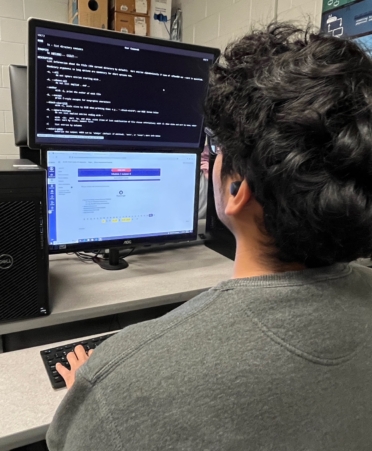(WACO, Texas) – Searching for a job in the cybersecurity field can be like looking for a sand dollar at the beach: it can be frustrating, but it can be fruitful when the best one is found.
“I do interview applicants occasionally,” said Rae Davis, senior cybersecurity engineer at Upbound Group in Plano and a member of Texas State Technical College’s Cybersecurity program industry advisory committee. “I have seen a lot of easily influenced young people very unprepared for the interview process. They are lacking things like formality, especially when it comes to work ethic. They read about things online like ‘coffee badging’ and ‘quiet quitting,’ and those really don’t serve them as potential engineers or analysts.”
TSTC’s Cybersecurity program teaches students using the performance-based education (PBE) model, allowing them to set their own learning schedule in a hybrid or online format. As part of PBE, students get focused lessons on resume writing and interview skills, and can participate in campuswide interview practicums.
“In our experience, entry-level cybersecurity graduates go to help desk or customer-facing positions when starting a career, which requires good communication skills,” said Hunter Henry, TSTC’s manager of employer relations for the East Williamson County, New Braunfels and Waco campuses. “But those skills are necessary no matter what you do. Co-workers benefit from the communication skills too.”
Agustin Lara, a TSTC cybersecurity instructor at the Waco campus, said working at a help desk enables workers to interact with back-end support specialists, network administrators, network engineers, risk managers and others.
“It teaches the students to learn all of the programs and how to communicate with people,” he said.
Lara said cybersecurity graduates can work in any field. A battle they will have to fight is phishing, a method used to extract personal information or install malware through what looks like legitimate emails, links, texts or telephone calls.
“Cybersecurity is a mentality,” Lara said. “If data gets exposed, it needs to be determined who exposed it and how it can be remediated.”
Lara said troubleshooting skills stay the same, no matter how much cybersecurity evolves. The program’s instructors teach troubleshooting using the Open Systems Interconnection model, which divides network communications into seven layers ranging from physical to application.
There are other skills that new cybersecurity graduates need to have.
Daniel Johnson, director of information and security at national accounting firm Carr, Riggs & Ingram, is a member of TSTC’s Cybersecurity program industry advisory committee. Johnson, a graduate of TSTC’s Harlingen campus, said students need to understand how technology works. He said that without knowing this, it can be hard to know when a cyberattack happens and how to contain it.
Johnson said new graduates need to know how cloud computing works. TSTC offers an advanced technical certificate in Cloud Computing, which is under the Computer Networking and Systems Administration program. The cloud computing classes focus on Amazon Web Services.
“Networks and systems are getting less sophisticated at local offices,” Johnson said. “More is being put in the cloud.”
Johnson said what excites him today is data privacy. He said hackers are using new technologies to do their damage.
“Every day is something new,” he said. “There is always something happening. We see artificial intelligence being used against us with our attackers.”
TSTC offers an Associate of Applied Science degree and two certificates of completion in Cybersecurity, along with an advanced technical certificate in Digital Forensics Specialist.
For more information on TSTC, go to tstc.edu.
